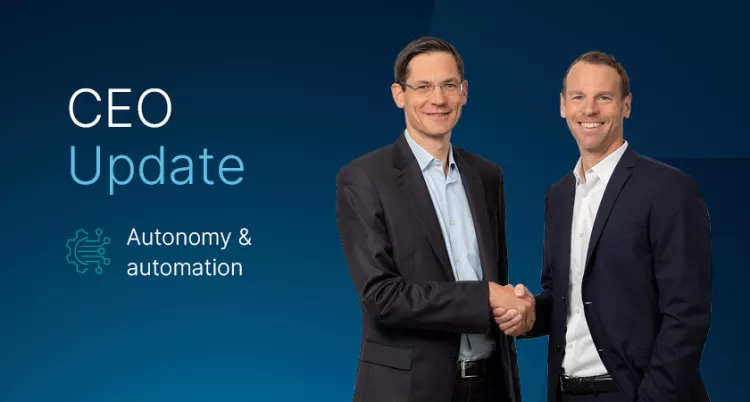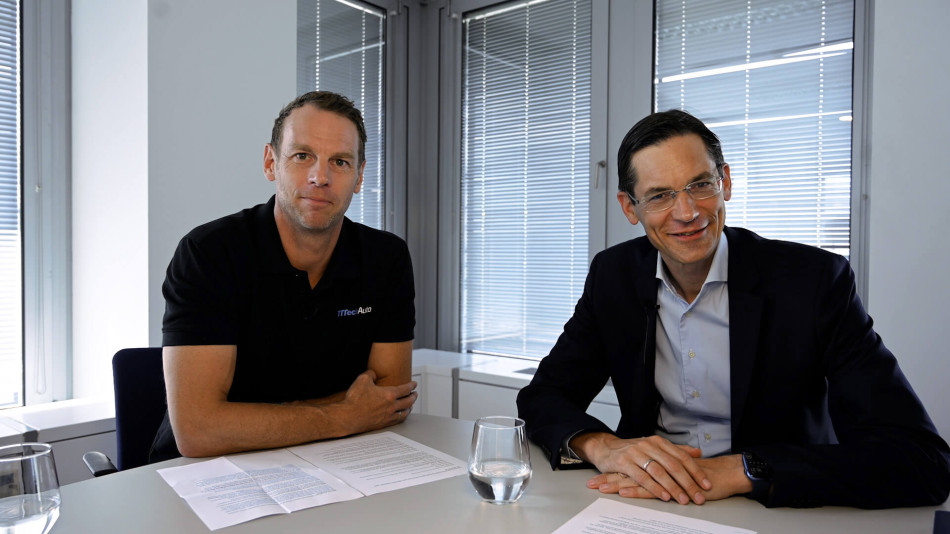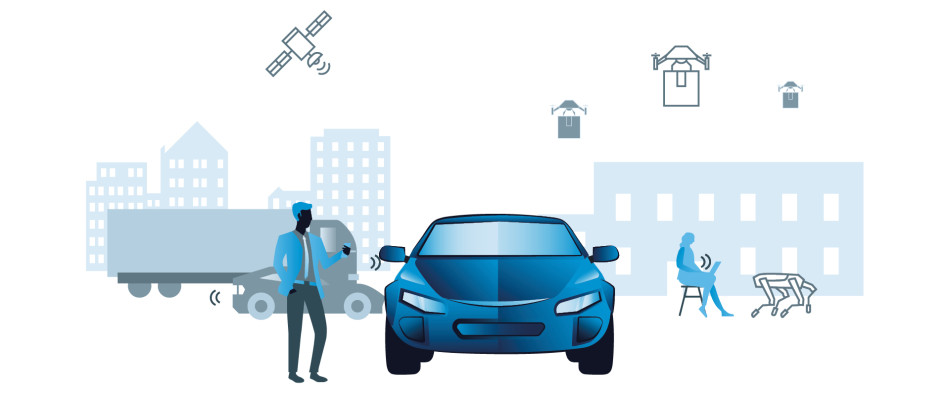
For this brand-new edition of our CEO Update, TTTech CEO and Co-Founder Georg Kopetz welcomed a very special guest: Dirk Linzmeier, CEO of TTTech Auto. Dirk has more than 20 years’ experience in the automotive industry and joined TTTech Auto in 2022.
The two CEOs talked about autonomy in various industries, with a special focus on autonomous driving and the “The Autonomous” Main Event, which will bring the autonomous mobility community together in Vienna in September 2023.
We are seeing a transition from automation to autonomy in many industries. What does this mean exactly? Can you name some examples from industries TTTech is active in?
Georg: I really like the term automation to autonomy, because in a way it encompasses the past, present, and future. We have been seeing increased automation, that is, increased usage of computer systems in our everyday machines and in our industrial products for the past 30-40 years. More and more functions that had to be performed by humans are now carried out by computers that increasingly use smart sensor technologies to perceive their environment. There has been a complete change in the way machines are operated. We are using computers to steer or control machines and that’s basically what we call automation. What’s new is that so far there’s always been a human in the loop, and now we are taking the human (partially) out of the loop or the control supervision, which is what we call semi-autonomous or even autonomous systems.
Which industries do you see getting autonomous first?
Georg: Probably industries that are less about transporting passengers, like agriculture or production, will reach higher levels of autonomy first. Municipal services like construction, garbage disposal or street cleaning are also shifting towards higher degrees of automation. For TTTech the question is, how can we create value for our customers within those industries and how can we then capture a fair part of this value with good recurring business models? Space and aviation technologies have been important forerunners in this development because they are getting more and more autonomous. Especially when it comes to safety, reliability, and availability, these systems then inspire safe autonomous systems on Earth.
Subscribe to our newsletterand receive CEO updates directly to your inbox
Experts speak of an “autonomy tipping point” that will be reached in the next 20 years when virtually all vehicles will rapidly become autonomous. Does this seem realistic to you? What will this mean for our society and our economy?
Georg: I think this will happen gradually rather than abruptly and it will happen according to the respective operational domain. For example, tractors may first be able to operate autonomously in the field but not on a public road. However, for our economy and for businesses, there will be a world (markets, business models) before autonomy and a world after. It will be a transformational shift for societies and economies, like the shift brought about by the combustion engine or even the steam engine in the Industrial Revolution. That’s why it’s so exciting to work in this area because you can be part of a defining period in human history.
Dirk: I see it the same way, one example is the highway pilot in your car. At some point, you’ll be able to enter a highway and take your hands off the wheel and your eyes off the road until you leave the highway. The highway is called “Operational Design Domain” ODD, and autonomous operation will be possible as long as you’re on the highway. The ODD will gradually increase which means more and more use cases will be covered.

How do you think our cities will look like once autonomous mobility has reached urban areas?
Dirk: In my opinion, once you have autonomous mobility in a city, you don’t need to own a car anymore, because basically mobility is available for everyone and it’s much cheaper because you replace the driver with an autonomous system. Cars will most probably be electric and maintain themselves by driving to a charging station autonomously. I imagine a certain fleet of cars will be available in each city because currently, most cars are only being used for two to three hours a day. Autonomy will optimize this usage so fewer cars are needed in total.
Georg: I think we are building or transforming towards green and smart cities in the future where we will reinvent how we work and live together. Smart autonomous machines will play a key role in making our lives easier. For example, once logistics and municipal services have become fully autonomous and electrified, they may be able to operate quietly during the night hours so that everyday life can carry on undisturbed during the day. I also think there will be fewer cars on the streets and that suburban areas that cannot be served by public transport right now could make use of so-called “robo taxis” to cover the last mile.
Georg, you co-founded The Autonomous in 2019 when you were CEO of TTTech Auto. Can you tell us a little bit about the initiative? What was your motivation for forming this global community on autonomous driving?
Georg: The reason for founding the Autonomous was three-fold. Firstly, innovation only flourishes in vibrant ecosystems. When it comes to autonomous systems, there’s no single company that can do it alone. Secondly, we wanted to be able to steer and influence the agenda and discuss the main obstacles on the way to autonomous driving. We defined four key issues that we wanted to focus on: safety, security, regulation, and AI. And the third motivation was to create more visibility for TTTech Auto, which was founded in 2018 to fully focus on automated and autonomous driving.
Dirk, you joined TTTech Auto as CEO in 2022 after an eventful career in the automotive industry. Were you familiar with the Autonomous before you joined? Where do you see The Autonomous today?
Dirk: Yes, I was aware of The Autonomous before I joined and I also knew TTTech, of course. I think it’s incredible what has been achieved in the four years since this initiative was founded. It’s a global ecosystem bringing together experts to discuss common issues like safety, systems, software, AI, regulation, and much more. And it’s not just the main event taking place in Vienna each year, different working groups are thinking about these topics year-round and then present their results in Vienna.

The Autonomous Main Event 2023 will take place on September 14 at the Hofburg Imperial Palace in Vienna. What can we expect from the event?
Dirk: This year’s motto is “Moving Beyond the Hype”. A couple of years ago, there was a big hype around the topic of autonomous driving with lots of startups being founded and now everyone involved is starting to realize that it’s taking a little bit longer than expected to make autonomous driving a reality. In my opinion, current initiatives are more solid and much more based on reality. Autonomous driving is evolving, but much more gradually and step-by-step.
Which speakers do you most look forward to?
Dirk: I personally look for a certain kind of diversity. Having speakers from OEMs, Tier 1s, startups, software companies, but also different regions. Of course, since we are based in Europe, we have strong European participation, but we try to extend our reach to the US and Asia as well and invite speakers from these areas.
What are the main challenges on the journey towards autonomous driving today?
Dirk: There are several challenges. On the one hand, you need a certain set of sensors, you need a certain redundancy, and one of the biggest challenges is safety. You surely have heard of the term software-defined vehicle (SDV), which means that a car is no longer a piece of hardware, it is built around software. Personally, I think software-defined vehicle doesn’t truly encompass the full complexity that exists on the level of architecture. At TTTech Auto, we don’t call it SDV, we call it 4-SDV, because it’s not just software. It’s software, it’s the system, it’s safety and security. In my opinion, these four elements are the major challenges for the future car industry and at the same time also for autonomous driving.

AI is the topic of the hour. What is the role of AI in autonomous driving? Is there a shift happening here as well or is it an established technology?
Dirk: That’s an interesting question because years ago when I did my Ph.D. in driver assistance, we already had AI, what we then called pattern recognition based on machine learning. So, AI always has been part of sensor systems and sensor processing, but of course, it is now on a completely different scale. We have really high compute power in the car, as well as new algorithms, in which AI plays a huge role. The challenge we are working on is to make the systems safe and predictable.
Georg: I see two application areas of AI in the automotive and special machinery application areas. One is for sensors and perception, as Dirk mentioned, where AI-based algorithms have been beating all other algorithms for years. The second, and much bigger trend is end-to-end AI, which means that the machine is learning along the complete control loop. For me, narrow AI today is basically “applied statistics”, which is probably not enough to ensure safety in autonomous machines, so we will need a safety system in addition, which monitors, controls and can super-cede the AI based systems.
TTTech is active in several industries in which autonomy plays a role. Is there a lot of cross-industry fertilization?
Georg: I think cross-industry fertilization is one of TTTech’s key differentiators. We have learned a lot about building safety systems and safe autonomous systems from the aerospace industry, which can be applied in the automotive industry. There’s also a big benefit for TTControl, our off-highway division, to use similar chipset families that are deployed in the automotive industry to enable economies of scale and longevity of supply.
Dirk: Definitely, I think it’s a big benefit for TTTech Auto to be able to say that our heritage systems have one billion flight hours in airplanes. The aerospace industry has a strong track record in safety, which is where we come from. The people working at TTTech Auto also often have a background in this area.
Subscribe to our newsletterand receive CEO updates directly to your inbox
Automated driving has five stages in total. Automated vehicles are currently around stage 2. Starting at stage 4, vehicles will be able to drive so independently that drivers will be able to focus their attention elsewhere, read, or take a nap. When will we see Level 4 automated driving on the road?
Georg: My bet is: in this decade, but not in all vehicles. I think luxury cars will be among the first, because “being driven” will be an extra feature that can be sold to customers. But I also think we will see Level 4 in some areas of public transport or special machinery.
Dirk: In my opinion, autonomous driving comes from two sides: Firstly, the ODD, the Operational Design Domain, will gradually expand and there will be more and more places where cars will be driving autonomously. Secondly, slow-moving restricted mobility, for example, on campus, may be driving fully autonomously, but very slowly at first. Gradually, the speed limit will increase. These two factors will expand until one day we have fully autonomous mobility.
Thank you very much for participating in our double-CEO update. These insights make us excited for the far future, but also the Autonomous Main Event in September.
Learn more: